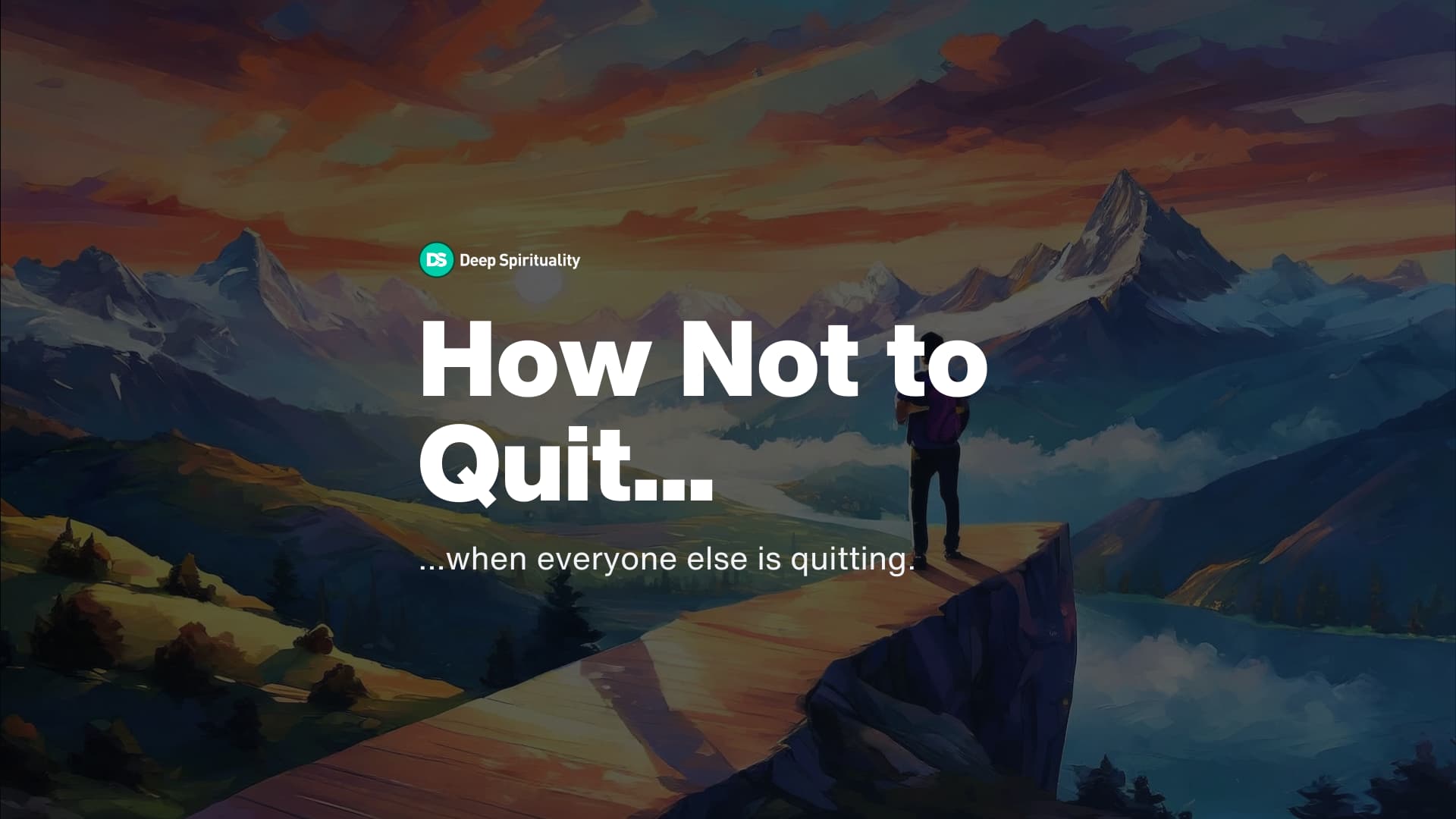When the king heard the woman’s words, he tore his robes. As he went along the wall, the people looked, and they saw that, under his robes, he had sackcloth on his body.
II Kings 6:30 NIV
King Jehoram didn’t want anyone to know his true spiritual condition.
He didn’t want anyone to know how overwhelmed, frightened, and hopeless he felt. On the outside, he acted like a king, but deep down he felt powerless. His superficial facade crumbled when a despairing woman cried out for help, and all he could say was, “If the Lord does not help you, where can I get help for you?” (II Kings 6:27).
The tragedy of her life made him tear his robes in a powerful display of emotional pain, revealing to everyone the sackcloth he had been concealing. This sackcloth expressed the true and deep feelings of his heart. Though Jehoram was not a particularly righteous king, God was moved to save Israel in no small part because of him. Jehoram changed the world.

“Deep Spirituality” is about removing the robes that cover up the true and deep feelings of our hearts. Though we might not be particularly righteous people, when we walk with God, we will in our own way change the world. This is the spirituality of Jesus – what he lived, what he taught, what he promises us, and what he expects from us (John 14:25-27, Galatians 5:16).
The spirituality of Jesus
The Pharisees heard the crowd whispering such things about him. Then the chief priests and the Pharisees sent temple guards to arrest him. [45] Finally the temple guards went back to the chief priests and the Pharisees, who asked them, “Why didn’t you bring him in?” [46] “No one ever spoke the way this man does,” the guards replied.
John 7:32,45-46 NIV
The spirituality of Jesus turned him into a revolutionary social force. He partied (Matthew 9:9-11), pleaded (Luke 13:34), coaxed (Matthew 11:28-30), and convicted (John 16:8) until he changed the world (Colossians 1:3-6).
People were never the same after meeting Jesus. He changed things. He changed you. His was a message of change. He was so irresistible that when guards were sent to arrest him, they were themselves arrested by his message. They returned to the religious establishment who had sent them inspired by but without Jesus.

The dynamic and transformative life of Jesus should be manifested in his church, which is why it is called the body of Christ (Ephesians 3:7-10, I Corinthians 12:12-27). Each individual Christian should walk with God in the same dynamic and transformative way Jesus did (II Corinthians 3:14-18, Galatians 2:20, I John 2:3-6). When each one of us walks with God in this way, we have the power to change the world. Anything less falls short of the greatness of God and Christ (Luke 9:43, John 14:12).
Since becoming a Christian over three decades ago, I have been in persistent pursuit of this dynamic, transformative walk with God and a community of believers who thirst for the same, so that together we can change our world the way Jesus changed his. While my faith in this scriptural vision remains strong, I have my doubts.
My central doubt is whether we are willing to change ourselves to the degree necessary to change the world. I am concerned about the levels of discouragement, disillusionment, and doubt that many of us have been carrying for too long.
People were never the same after meeting Jesus. He changed things. He changed you.
When I talk to Christians who are willing to shoulder responsibility beyond their own lives, it is obvious that a great number are experiencing unsustainable levels of stress. This makes me wonder how long it will be before they give up and quit serving.
I am not merely making observations but have experienced this spiritual withering in my own life, which is how I discovered “Deep Spirituality.”
What is Deep Spirituality?
…The Spirit searches all things, even the deep things of God. [11] For who knows a person’s thoughts except their own spirit within them? In the same way no one knows the thoughts of God except the Spirit of God.
[12] What we have received is not the spirit of the world, but the Spirit who is from God, so that we may understand what God has freely given us. [13] This is what we speak, not in words taught us by human wisdom but in words taught by the Spirit, explaining spiritual realities with Spirit-taught words. I Corinthians 2:10-13 NIV
“Deep Spirituality” is the personal, powerful, emotional, and intimate experience of God that allows us to exceed our human limits. When we reach and live at this level of spirituality, we transcend “the elemental spiritual forces of this world” (Colossians 2:20-23).
In other words, we no longer limit ourselves to what is humanly possible (Matthew 19:26, Mark 10:27 NLT). The rules of humanistic thinking inform but do not restrict us; we can acknowledge the wonders of science and, at the same time, be humbled by the inexplicable miracles of God. We are the people who fulfill the inspiring words of Morpheus in The Matrix when he said, “Free your mind.”
When we are deeply spiritual, we see God everywhere and in everything. We enjoy the world we see without ignoring the enormous possibilities existent in the unseen.
This type of faith and relationship with God is how many of us became Christians. “Deep Spirituality” is about reigniting our spiritual curiosity and renewing our spirit of discovery, so we can know God as we have never known him before.
What is spiritual withering?
I am the vine, and you are the branches. If you abide in Me and I in you, you will bear great fruit. Without Me, you will accomplish nothing. [6] If anyone does not abide in Me, he is like a branch that is tossed out and shrivels up and is later gathered to be tossed into the fire to burn.
[7] If you abide in Me and My voice abides in you, anything you ask will come to pass for you. [8] Your abundant growth and your faithfulness as My followers will bring glory to the Father. John 15:5-8 Voice
Life can be hard. I remember having a wisdom tooth removed by a less than reputable dentist. She advised me of the decay in said tooth and suggested removal. I responded fearfully, communicating my understanding that wisdom tooth removal was best left to surgeons.
She responded with a confidence that made me lower my defenses, and the procedure began. Three hours later I was broken, withering under the assault of pain and absent of any will to fight. I understood why the pharmaceutical industry does so well. The hardness of life can do a similar thing to us spiritually.
Spiritual withering is a state of brokenness where we lose our will to fight. We become so disillusioned, disappointed, and discouraged that we stop fighting to believe. We turn away from God and turn to cynicism (I’ve heard it all before, and you will only let me down), callousness (I will never ever let myself be hurt this much again), or in some cases, destructive self-condemning negativity (It is all my fault; I deserve to suffer because I am a terrible person, and God can’t possibly forgive me).
My concern is that more of us are spiritually withering than know it.
I have found myself on this downward emotional spiral of spiritual withering on more than one occasion. During those times, I felt the pressure to appear stronger than I was, the fear of being rejected if I told the truth, and the appealing temptation to run away from it all. While it hasn’t been easy, God has always been the answer, and spirituality has always been the path.
My concern is that more of us are spiritually withering than know it, and the facts bear this out. Christianity has been in decline, and people are turning away from church. I believe this has less to do with our stylistic tendencies and traditions than our spiritual condition. But before we tackle the solutions, let’s take a look at the facts.
Facing the facts
Against all hope, Abraham in hope believed and so became the father of many nations… [19] Without weakening in his faith, he faced the fact that his body was as good as dead—since he was about a hundred years old—and that Sarah’s womb was also dead.
[20] Yet he did not waver through unbelief regarding the promise of God, but was strengthened in his faith and gave glory to God, [21] being fully persuaded that God had power to do what he had promised. Romans 4:18-21 NIV
We cannot be afraid to hear and understand that the U.S. population is trending toward a rejection of organized religion and the traditional church. We must instead read the facts, reorient ourselves to the changing landscape, and then embrace a “Deep Spirituality” so we can reinvent ourselves for the 21st century.
Jon Meacham, one of America’s most prominent historians and a prescient public intellectual, penned a powerful piece for Newsweek in the April 3, 2009 issue which was called “The End of Christian America.” He highlighted a powerful truth about the decline of Christianity and its influence on America using the term post-Christian to describe the world in which we currently live.
“There it was, an old term with new urgency: post-Christian. This is not to say that the Christian God is dead, but that he is less of a force in American politics and culture than at any other time in recent memory. To the surprise of liberals who fear the advent of an evangelical theocracy and to the dismay of religious conservatives who long to see their faith more fully expressed in public life, Christians are now making up a declining percentage of the American population.”
Jon Meacham, The End of Christian America
Mr. Meacham believes the often predicted decline of Christianity is upon us, and those who ignore this truth ignore the facts. According to the 2006-2007 National Congregations Study directed by Professor Mark Chaves of Duke University, the average American congregation has just 75 regular participants.
When I saw the average congregation had only 75 participants, I was shocked but drew some encouragement from the increasing number of megachurches. The Hartford Institute tracks megachurches and defines them as having 2,000 or more participants. The Bay Area Christian Church, where I serve as Director of BACC Next, is listed and considered a megachurch.
My encouragement was short-lived when I discovered a substantial element of megachurch growth has resulted from “the movement of people from smaller to larger churches.” The fact that “the largest 10% of congregations contain about half of all churchgoers” is therefore not necessarily an indication of growth. Rather, it indicates that people are leaving small churches to take advantage of greater resources in the larger ones. This is called “transfer growth” in Evaluating the Church Growth Movement (page 104). I have learned from personal experience that this type of growth can conceal the decline of any church.
I don’t see a less religious nation as a problem because this isn’t a response to God or spirituality, but rather rules and tradition.
We should admit that “transfer growth” is a false indicator of church attractiveness or health and instead measure ourselves by the response of those who have no interest in organized religion (non-religious).
Pew Research Center (U.S. Public Becoming Less Religious) describes these non-religious people as the “nones,” which “now account for 23% of the adult population, up from 16% in 2007.” These “nones” are considered the fastest growing religious group in America, and Millennials are increasingly choosing this category to describe their religious beliefs. In the years to come, the Millennial generation will increase their share of the total U.S. population. If they continue to select the religious choice of “none of the above,” then we are going to be looking at a more secular and less religious nation.
I don’t see a less religious nation as a problem because this isn’t a response to God or spirituality, but rather rules and tradition. For instance, in the Pew Research report 89% of the people said they believe in God, while “About six-in-ten adults now say they regularly feel a deep sense of ‘spiritual peace and well being,’ up 7 percentage points since 2007.”
All of this tells me Americans are searching for spirituality but are turned off by religiosity (traditions, rules, and failure to innovate). If we commit ourselves to a path of “Deep Spirituality,” then like Jesus, I believe we will help people find the God they are looking for.
Becoming deeply spiritual
What matters is that you come to Me, hear My words, and actually live by them. [48] If you do that, you’ll be like the man who wanted to build a sturdy house. He dug down deep and anchored his foundation to solid rock. During a violent storm, the flood waters slammed against the house, but they couldn’t shake it because of solid craftsmanship. [It was built upon rock.] Luke 6:47-48 Voice
The Pew Research has convinced me that the greatest threat to Christianity is the superficiality of religiosity. The Pharisees were masters of this lifestyle and doomed a generation of believers by teaching it, which is why Jesus reserved his strongest rebukes for them. Their superficial spiritual lifestyle was based on appearances, not substance, which made them treat serious problems in shallow ways, making them responsible for the spiritual withering of a generation (Matthew 23:4).
Jesus rebuked their superficial attachment to religious tradition and position instead of God (Matthew 15:8-9, Matthew 23:1-3). He exposed their superficial motives. Refusing to seek and know the love of God, they chose instead to pursue the attention of position over people (Matthew 23:5-7).
The Pew Research has convinced me that the greatest threat to Christianity is the superficiality of religiosity.
These Pharisees ignored the condition of their hearts choosing instead to polish their pretending behaviors (Matthew 23:25-28). Their superficiality was so abhorrent to Jesus that he warned his disciples about their insidious and deadly influence – the capacity to infect others with hypocrisy, the ultimate superficiality (Luke 12:1).
All of this could have been prevented if more Pharisees had followed the direction of Jesus, which was to dig down deep and lay a foundation on solid rock. This digging down deep is exactly what “Deep Spirituality” is all about. To be certain, Pharisees (the religious establishment) do not enjoy this level of depth. But if we go deep, we will overcome the Pharisee in all of us. This is exactly what Jesus told us we needed to do if we are going to make his Kingdom attractive.
For I tell you that unless your righteousness surpasses that of the Pharisees and the teachers of the law, you will certainly not enter the kingdom of heaven.
Matthew 5:20 NIV
The spiritual journey of “Deep Spirituality” will begin with us delving into subjects like “Deep Quiet Times,” “Deep Reading,” and in a variety of ways dealing with “Deep Spiritual Dysfunction.” The goal is for each one of us to use these resources to build our relationship with God, deepen our spirituality, improve our spiritual relationships, and, with God working through us, ultimately change the world.
Browse series
- Introduction
- Feature: Deep Spirituality
- Deep Quiet Times
- Deep Reading
- Deep Prayer
- Deep Vision
Explore more:
As the editor in chief for Deep Spirituality, Russ Ewell writes, teaches, and innovates with his eyes on the future. His teaching is rooted in providing hope for those turned off by tradition and infused with vision for building a transformative church. His passion to inspire even the most skeptical to view God through fresh eyes can be found in his book, He's Not Who You Think He Is: Dropping Your Assumptions and Discovering God for Yourself.
As the editor in chief for Deep Spirituality, Russ Ewell writes, teaches, and innovates with his eyes on the future. His teaching is rooted in providing hope for those turned off by tradition and infused with vision for building a transformative church. His passion to inspire even the most skeptical to view God through fresh eyes can be found in his book, He's Not Who You Think He Is: Dropping Your Assumptions and Discovering God for Yourself.




